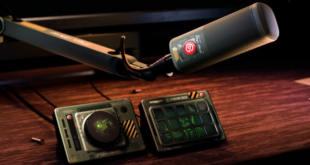Imagine a world where advanced electronic devices can be embedded into the human body, correcting problems and monitoring/enhancing function. Impressive stuff. But there is a dark side. A very dark side. KitGuru dreams of a jump-suited Raquel Welch while considering a modern day fantastic voyage.
Roll the clock back 40 years and advanced cybernetic implants were the stuff of science fiction. Push the clock forward less than 20 years and we could be a lot closer to a world where man's best friend is a multi-purpose silicon health nugget.
Watching Steve Austin, a man barely alive, being re-built in a way to make him better, stronger and faster kept audiences glued – and Jamie Sommers had her own special following. Nuff said.
OK, so that was the Hollywood-romanticised version of the future, but with advances in material science, telemetry and core computing – cybernetic integration is with us. The developments themselves will come in surges, as is the way with all new fields of development, but most experts agree that 20 years from now, we will be living in a brave new world. Something like the one being spoofed on the Sarif Industries site.

All sunshine and roses then? Actually, no.
With the procedures initially complicated and expensive, there has to be a good chance the rich/important folks are more likely to hit the tables early. But if these early converts take the larger risks – and help increase the learnings for everyone else – then what's the problem?
The problem is that computerised systems are fundamentally open to attack. Ah. Now you see it.
Here's an example. If the President of the United States had an artificial component integrated into his system, would that leave him open to a new and invasive kind of attack? The simple answer must be ‘yes'. Either the device could be hacked and re-programmed to do something different from its original design specification – or maybe a new kind of remote weapon could be created which allowed assassination without anyone knowing that the attack had happened or why. Maybe an intelligently modulated pulse at the right energy/frequency level.
The killer [pun intended – Ed] would be the straightforward hack. Dialling into an embedded device and then adjusting the settings to induce (a) decision changes, (b) pain or (c) death. The people behind the hack could be loved ones that think you're living too long without surrendering the goodies on your will – or they could be spouses keen to control what you do and how you do it. Either way, the threat is very real.

The smart folk at MIT have come up with ‘secondary transmitters', which can send out jamming signals to block incoming threats to the control of your computerised implants. But what would the shield look like?
MIT boffins considered embedding the blocking technology into the implants themselves, but considered it too big a risk. Instead, they believe that ‘active jewellery' is the way forward – possibly a locket on a necklace – possibly an earring.
How long until this piece of science fiction becomes science fact? Well, you can read all about it, in-depth, in this PDF.
Well, according to sources near MIT – they are planning to show off a working model at an event this year, possibly this one.
KitGuru says: With all of the stories out there about Sony etc getting hacked six-ways from Sunday, it's easy to see that this threat is real. For normal folks, it would leave you open to simple extortion/murder. For heads of state, the nuances become multiplied. This ‘keeping people alive with cybernetics' could be a tricky business. Can MIT protect you from remote assassination? Possibly. But would you bet your life on it?
Comment below or in the KitGuru forums.
 KitGuru KitGuru.net – Tech News | Hardware News | Hardware Reviews | IOS | Mobile | Gaming | Graphics Cards
KitGuru KitGuru.net – Tech News | Hardware News | Hardware Reviews | IOS | Mobile | Gaming | Graphics Cards


